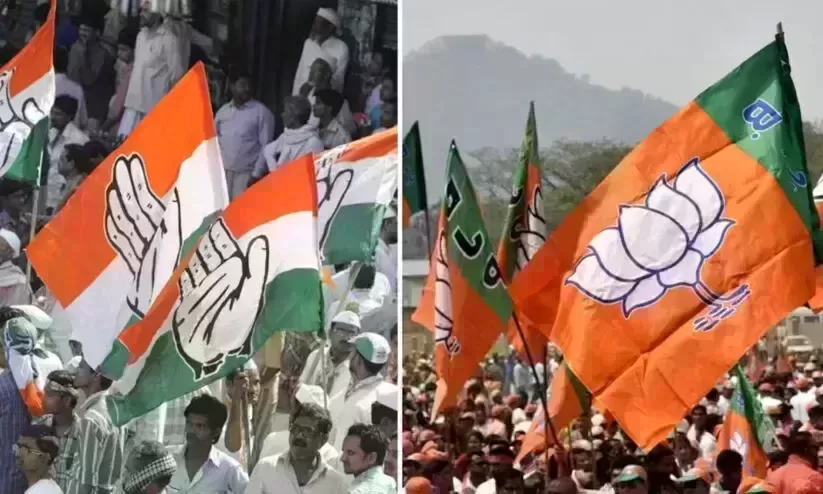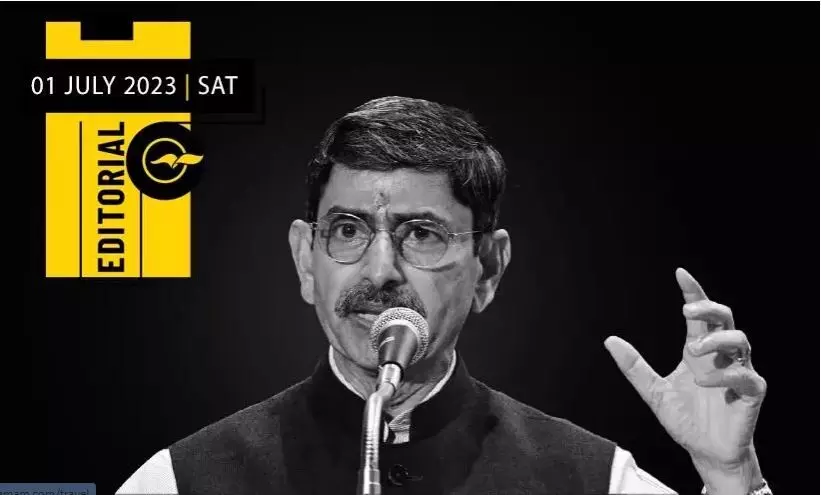
After ED, the Governor’s turn
text_fieldsIn the last few days, Tamil Nadu witnessed unprecedented developments in the history of independent India. Senthil Balaji, a DMK leader who was arrested by the Enforcement Directorate (ED) on corruption charges and is currently in judicial custody, received an order from Governor R.N. Ravi informing his removal as a minister, triggering a new political turmoil in Tamil Nadu. The governor's order highlighted concerns that Senthil, who is involved in multiple criminal cases, could hamper the ongoing investigations. This move, which disregarded the rule that a minister's resignation should be recommended by the chief minister, has angered the ruling DMK and its allies. It's worth noting that Chief Minister M.K. Stalin learned about the incident only when he saw the news release of the order from Raj Bhavan. Consequently, widespread protests erupted within and outside the state. However, five hours later, the governor rescinded the order. In a letter to the Chief Minister explaining the reversal, the governor stated that it was done based on the instructions of the Union Home Minister, following legal advice from the Attorney General. While this brought the immediate situation to a close, the political uncertainty lingers.
Senthil Balaji served as the Transport Minister in the Jayalalithaa government from 2011 to 2015, when he was the Anna DMK leader. He is currently facing accusations of accepting bribes under the guise of job recruitment for over 1700 workers in the Metropolitan Transport Corporation during his tenure. In 2018, he left his previous party and joined the DMK, subsequently winning the Karur constituency with a convincing majority of 12,000 votes and became a member of Stalin's cabinet. Senthil's transfer, as a prominent leader in Konkunad including the Karur constituency, dealt a major blow to both Anna DMK and the BJP in Tamil Nadu. Consequently, the central government has been attempting to contain Senthil and weaken the anti-Modi alliance led by Stalin, particularly in South India, over the past two years. As part of this effort, the old case against Senthil was reopened, and the Enforcement Directorate (ED) was brought to Tamil Nadu. In the second week of June, Senthil was arrested after a day marked by chaos, including raids on his office at the Tamil Nadu Secretariat. However, due to health issues, he could not be immediately taken into custody and was later placed in judicial custody. Leaders, including Stalin, have accused the ED of disregarding proper procedures during these actions. Nevertheless, the central investigation team seemed to act without restraint, disregarding protocol. Recently, the Chennai High Court intervened, granting Senthil, who is currently recuperating in the hospital after undergoing an angiogram surgery, some relief.
Following the arrival of the Enforcement Directorate (ED), the governor swiftly joined the mission. Soon after Senthil's arrest, Stalin promptly relieved him of the portfolios he was overseeing. However, he ensured that Senthil remained a part of the cabinet to address the issue from a political standpoint. Consequently, Senthil finds himself as a minister without a department due to his arrest. Currently, he is in judicial custody under the ED's supervision. The pertinent question arises: How can he sabotage the investigation conducted by the central agency in his current position? Furthermore, the Governor's authority to dismiss such a minister is being questioned. Constitutional experts refer to Article 164(1), which stipulates that the Governor cannot remove a minister without the knowledge or approval of the Chief Minister, regardless of the reason. For the first time in India, a minister had to remain out of office for at least five hours, highlighting an abuse of power by the central government. The "Governor Raj" phenomenon has become particularly prominent during the Modi era, affecting numerous opposition states across the country, including Kerala. These states have long struggled with encroachments on their rights by the central government, implementing the latter's agenda in their territories. Opposition states have frequently clashed with this new ruling class. Now, RN Ravi is wielding newfound power as never done before. Although the political drama has momentarily subsided, the possibility of its revival cannot be dismissed.
























